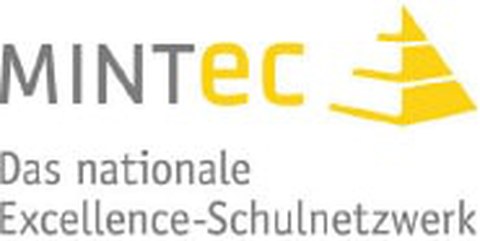Information for schools
Table of contents
Motivation
The project week offers students the opportunity to put their interests in TU Dresden's study programs into practice in a fun way. Our aim is also to create a link between scientific principles and practical application for the participants and to train them in interdisciplinary skills such as teamwork, communication, conflict management and time and project planning. All this is done from the point of view that topics of social interest can no longer be solved by one specialist discipline alone, but require an interdisciplinary exchange .
For pupils in particular, the project week is an opportunity to find their bearings with regard to future study and career choices, to get to know experts from the disciplines, to ask questions and to try things out in the respective subject areas.
The task is set by an industry partner and calls for solutions to a company-specific problem. There are no ready-made solution templates for working on the task. Creativity and free design are desired.
Accordingly, our offer is aimed at upper secondary school students who are interested in engineering issues.
For students in the MINT-EC school network, participation is rewarded with 10 points in the certificate program.
Pedagogical-didactic concept
Principle of minimal help
The overarching aim is for students to
learn to tackle open problems independently or in a group.
to tackle open problems. The first step is to support the group
be supported through motivation and feedback.
If this is not sufficient, further assistance is offered.
offered.
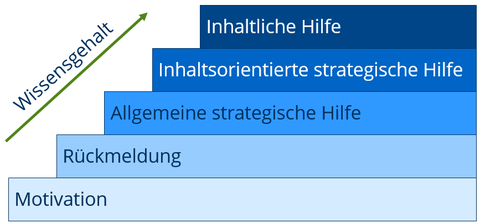
Prinzip der minimalen Hilfe
Watching is better than intervening, listening is better than showing a solution. If a group is helped too early in terms of content, dependency increases. For this reason, help with content should not be provided directly, even if the group expressly requests it, but rather as a last resort.
5-minute rule
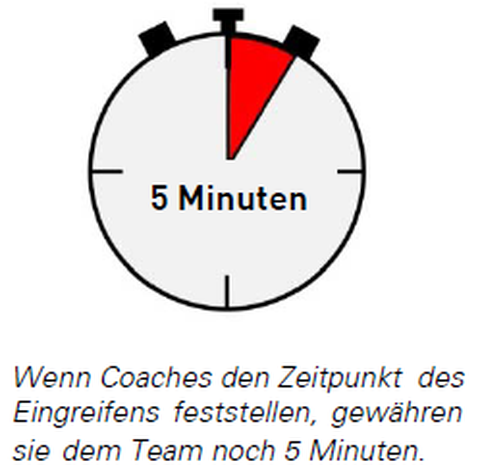
5-Minuten-Regel
After the five minutes have elapsed, the coaches can intervene and provide support according to the step-by-step model of minimal help. This ensures that the work team recognizes and resolves the complications on its own.
Support model
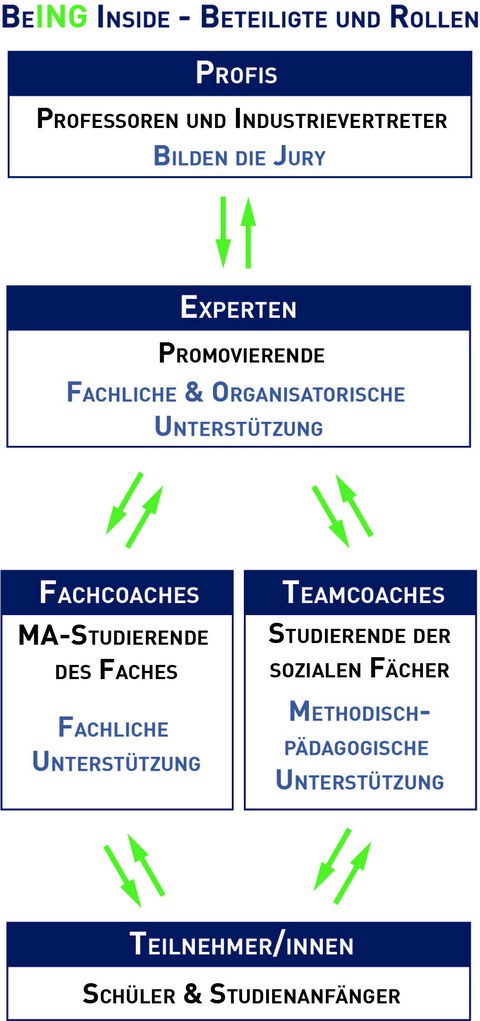
Betreuungsmodell
The experts, team coaches and specialist coach es are responsible for supporting the work teams. Each team is supervised around the clock by a team coach and specialist coach assigned to the group.
- Experts are research associates of the participating chairs. They have extensive expertise on the topic and are available to the students in the form of consultation hours via video conference.
- Specialist coaches are students from the higher semesters (diploma) or Master's students and offer help with technical questions. They ensure compliance with the content requirements and support the methodical approach.
- Team coaches are Master's students from the fields of psychology, communication science, educational research, etc. They help participants to form teams and teach teamwork rules. They think their way into the group's reference systems and provide feedback on development. You support conflict management and the structuring of work processes. You will also introduce creativity, team development and cooperation methods.
Dates and procedures
Please note that due to the time required for the project week, students must be released from school.
| Timeline | Contents |
|---|---|
| 01.12.2024 until 10.12.2024 |
Registration of students via the MINT-EC camp: Events: MINT-EC |
| until 01.02.2025 | Registration of further pupils with Daniel Knöfel |
| from 05.03.2025 |
|
| from 12.03.2025 | Return of the completed personality tests to Thao Luu Thi |
| from 13.03.2025 |
Dispatch of the weekly schedule with information on
|
|
24.03.2025 |
Interdisciplinary project week BeING inside |
Schools
Participation and attendance
Since 2018, school teams have also been supervised during the project week in addition to the student teams. Around 40 places are available for this. Your school has never delegated students and you are interested in participating? Then get in touch to request participation.
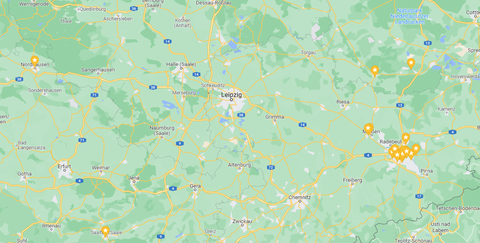
Standorte der bisher beteiligten Schulen
The teachers can visit your students at the TU and gain an insight into the processes. Please register in advance by e-mail.
Costs
- Pupils from interregional grammar schools will be provided with overnight accommodation in Dresden. The rooms are organized by the Research & Practice orientation platform. Funding is provided by the practice partner.
- Travel costs to and from the event must be borne by the participants themselves.
- Meal costs are incurred for visits to the Studentenwerk canteens. The students receive canteen cards and can eat for the student price. In addition, the practice partner covers the costs for drinks and the provision of an afternoon snack.
Impressions
Contact us
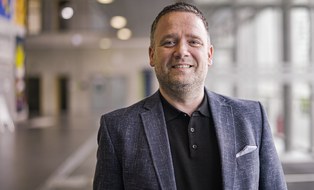 © Ravir
© Ravir
Orientation Platform Research & Practice
NameDaniel Knöfel
Coordinator School of Engineering Sciences
Send encrypted email via the SecureMail portal (for TUD external users only).
Dean's office, Faculty of Electrical and Computer Engineering
Dean's office, Faculty of Electrical and Computer Engineering
Visiting address:
Barkhausen-Bau, Raum 162 Helmholtzstr. 18
01069 Dresden
None
